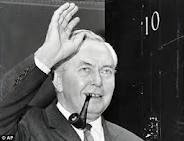Saturday, 31 March 2012
Collective Responsibility
Ultimately, the enforcement of the doctrine of ‘Collective Responsibility’ is down to the Prime Minister.
As the current version of the Ministerial Code states “Decisions reached by the Cabinet or Ministerial Committees are binding on all members of the Government.”
Harold Wilson, in his book describing his last period in office as Prime Minister (March 1974- March 1976), “Final Term” describes the problems he faced over ‘collective responsibility’.
“At a meeting of a sub-committee of the National Executive Committee [the Governing body of the Labour Party] in May [1974] three ministers dissociated themselves from Government policy by voting for a critical motion about [Chilean ships]…The problem was to come up again just after the October [1974] General Election, when three ministers voted in favour of a National Executive resolution criticizing the Government over a routine naval visit to Simonstown.”
Wilson wrote to the three offending Ministers – Tony Benn; Judith Hart and Joan Lestor:-
“Your vote in support of the Simonstown resolution at yesterday’s meeting of the National Executive Committee was clearly inconsistent with the principle of collective responsibility…..I must ask you to send me in reply to this minute an unqualified assurance that you accept the principle of collective responsibility and that you will from now on comply with its requirements and the rules that follow from it, in the National Executive Committee and in all other circumstances. I must warn you that I should have to regard your failure to give me such an assurance, or any subsequent breach of it, as a decision on your part that you did not wish to continue as a member of this administration.”
Location:
Milton Keynes, UK



